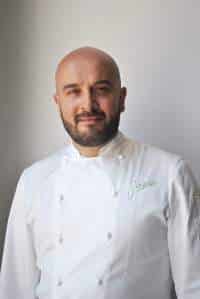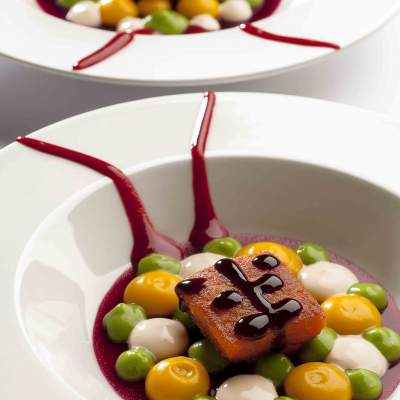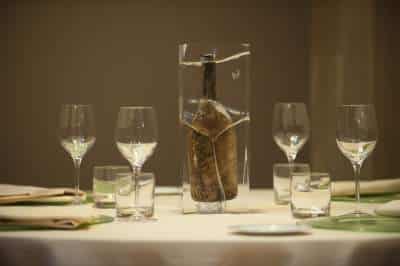Acetaia Guerzoni interviews Sauro Ricci, executive chef at Joia restaurant in Milan, the famous, Michelin awarded, fine dining, vegetarian restaurant.

Sauro Ricci, the executive chef at
Joia restaurant, in Milan, considers the food in a holistic vision, nourished by ethics,
philosophy, spirituality.
Being fascinated by the cultural and philosophical aspect of cooking, after
the culinary school, he was trained in fine dining world by working with
chefs like Antonio Guida and Michelino Gioia .
Ricci graduated in anthropology at the University of Siena, in 2010, with a
thesis on macrobiotics, and he completed his studies in Lisbon at the
Portuguese Macrobiotic Institute.
When he became the executive chef at Joia, the famous vegetarian restaurant
founded by
Pietro Leemann
and awarded with a Michelin star in 2013, he finally got the chance to merge
the fine cuisine with the sustainable food.
You started to collaborate with Acetaia Guerzoni thirty years ago. Which philosophy and goals do you have in common?
We certainly share an ideological idea of food that respects both nature and
producers, as well as the clients.
Our philosophy is a belief in organic and sustainable food. We both support
the importance of quality, the value of an artisanal product in harmony with
nature.
Which dish at Joia better represents the Acetaia Guerzoni?
“La luce del mattino” (“The Morning Light”) dish is a melon gazpacho, with a
sort of almond egg and a Guerzoni balsamic vinegar used by creating a
contrast.
Another dish which uses Guerzoni vinegar at its best is “Appunti di viaggio”
with a parmesan fondue, homemade pesto made with lots of herbs and nuts, a
25-year-old balsamic vinegar.
We use Guerzoni vinegar not as a condiment but to stimulate and open a broad spectrum of flavors, nuances.
Another interesting dish is “Carpaccio del Benessere”, a carpaccio of watermelon, 18 months old Parmesan cheese, 12 year old balsamic vinegar, extra virgin olive oil, chives, cocoa butter, black pepper, thyme . We also use Saba Guerzoni, a healthy “Mosto d’Uva” made with grape juice with which we balance our Teriyaki sauce.
Joia is not just a vegetarian fine dining restaurant that supports a certain vision and philosophy. There is also Joia lab, Joia at home and Joia Academy?
Joia Lab was created by our desire to expand our offer and update it to this current time. We have put together our handcrafted products, including Guerzoni products, and made them available in our showroom. .
We want to offer the city of Milan the possibility of having fresh and high
quality vegetable, some fermented vegetables, condiments and other
ingredients that can only be found here.
Joia at home is a service that comes from the desire to bring our dishes
directly home.
Then, Joia Academy was created with the intention of spreading the values of
vegetarian science, developed from a philosophical, social, medical,
psychological, agricultural point of view. Through a rich program of both
training and theoretical courses open to the world of professionals and
enthusiasts, the Academy becomes the right method and approach to be able to
create a healthy cuisine.
.
Among the various reflections brought during the pandemic there is one about rethinking food, in a new way, under the guideline of concepts such as sustainability. What do you think?
I believe that sustainability is often an overdone concept. Some chefs do an
extraordinary job because they are sensitive and respectful to nature, human
work, environment. But it doesn’t apply to everyone. Sustainability is our
guideline that underlies the creation of Joia.
When it comes to cooking, it is inevitable, I would say essential, to start
from nature and respect for the environment.
What are the advantages of the biodynamic?
Many. For instance, the taste is different, then, biodynamic implies a certain respect for the environment and people. Last but not least, using organic and biodynamic products means to contribute to respect man’s work, the quality of the raw material. Biodynamic is ideally related to clean energies.
You have dedicated yourself to macrobiotic, vegetarian and vegan cuisine. What are the most important aspects you want to share?
Cooking is a philosophy and a life style that embraces numerous aspects:
identity, economic, cultural, social.
If we adopted a vegetarian lifestyle, we would reduce the use of fossil
energies, as well as water and cereals. Not to mention the suffering we
cause to animals by eating meat.
My relationship with food aligns with my relationship with mother earth and
the whole thing is a lifestyle for me. The two things cannot be separated.
Working as a chef for me it also means doing research, experimenting with
new tastes. Today, for example, I am deepening into the ancient Ayurveda
philosophy and medicine and trying to use it into the kitchen.
Cooking for me it is, as well as eating, the ultimate expression of
awareness.
How the food will look like in the future?
Awareness is important. A good food has to play a role in the social,
economical, political arena.
It needs to be sustainable, seasonal, respectful . Not only that. Food needs
to bring awareness about certain political topics like the environment.
Being aware means rethinking the food in a new prospective.
Food is an exchange of energy, it is pure pleasure. It is a transcendental
action, it is nourishment for the soul, because if you think about it, it
comes from the Infinite.












